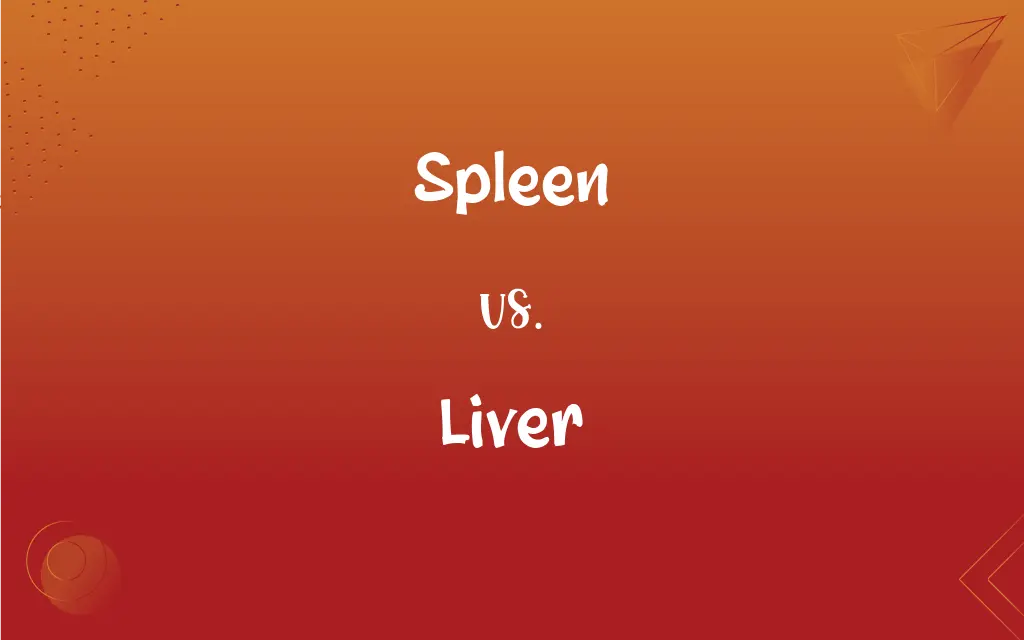Spleen vs. Liver: What's the Difference?
Edited by Aimie Carlson || By Janet White || Published on December 9, 2024
The spleen is an organ involved in filtering blood and immune system responses, while the liver is responsible for detoxification, metabolism, and bile production.

Key Differences
The spleen primarily functions in filtering old red blood cells and aiding the immune system by producing white blood cells. The liver, the body's largest solid organ, is a metabolic powerhouse, processing nutrients from food, producing bile, and removing toxins.
Diseases of the spleen often involve enlargement or rupture, affecting its ability to filter blood effectively. Liver diseases, however, are diverse, ranging from hepatitis, cirrhosis, and fatty liver disease, often linked to diet, alcohol consumption, or viral infections.
The spleen is located in the upper left part of the abdomen, functioning as part of the lymphatic system with a focus on blood filtration. The liver is positioned in the upper right part of the abdomen, divided into two lobes, and plays a critical role in digestion and detoxification.
Both organs interact with the blood, the spleen's role is more directly linked to the immune system, monitoring and responding to blood pathogens. The liver's immune function is more indirect, breaking down pathogens as part of its detoxification process.
The spleen has a limited ability to repair itself after damage. In contrast, the liver is known for its remarkable capacity to regenerate even after significant injury, highlighting its vital role in the body's overall functioning.
ADVERTISEMENT
Comparison Chart
Primary Function
Filters old red blood cells, supports immune system.
Metabolizes nutrients, produces bile, detoxifies.
Common Diseases
Enlargement, rupture.
Hepatitis, cirrhosis, fatty liver disease.
Anatomical Position
Upper left abdomen, part of lymphatic system.
Upper right abdomen, divided into lobes.
Role in Immune System
Direct, monitors and responds to blood pathogens.
Indirect, detoxifies pathogens.
Regeneration Capacity
Limited.
High, can regenerate after significant injury.
ADVERTISEMENT
Spleen and Liver Definitions
Spleen
An organ involved in filtering blood and housing immune cells.
The doctor explained that the spleen plays a crucial role in fighting infections.
Liver
A vital organ responsible for detoxification and metabolism.
The liver's detoxification process protects the body from harmful substances.
Spleen
Acts as a blood reservoir, releasing blood during physical stress.
In emergencies, the spleen contracts to provide extra blood to the body.
Liver
Processes nutrients absorbed from the digestive system.
After meals, the liver is busy processing and distributing nutrients.
Spleen
Removes old and damaged red blood cells from circulation.
The spleen's filtration of blood ensures only healthy red blood cells circulate.
Liver
Regulates blood sugar levels by storing and releasing glucose.
The liver helps maintain steady blood sugar levels throughout the day.
Spleen
Supports the immune system by producing lymphocytes.
The spleen's lymphocytes are essential for an effective immune response.
Liver
Produces bile, essential for digestion, especially fats.
Bile produced by the liver is stored in the gallbladder until needed for digestion.
Spleen
Vulnerable to enlargement or rupture from various conditions.
After the injury, the patient's spleen was carefully monitored for signs of rupture.
Liver
Capable of remarkable regeneration even after injury.
The patient's liver regenerated well after a portion was surgically removed.
Spleen
A large, highly vascular lymphoid organ, located in the human body to the left of the stomach below the diaphragm, that serves as a reservoir for blood, destroys old red blood cells, and contains lymphocytes that combat blood-borne antigens.
Liver
A large, reddish-brown, glandular organ in the abdominal cavity of vertebrates that secretes bile and is active in the formation of certain blood proteins and in the metabolism of carbohydrates, fats, and proteins.
FAQs
How does the liver contribute to digestion?
The liver produces bile, which is crucial for fat digestion.
What are common diseases affecting the liver?
Common liver diseases include hepatitis, cirrhosis, and fatty liver disease.
What is the primary function of the spleen?
The spleen filters blood and supports the immune system.
Is liver damage always irreversible?
The liver can often regenerate, but extensive or chronic damage may be irreversible.
What happens if the spleen is removed?
Other organs take over its functions, but susceptibility to infections may increase.
Can you live without a spleen?
Yes, but with increased risk of infections and a need for certain vaccinations.
How does the spleen respond to physical stress?
It releases stored blood to help the body respond to stress.
How does the spleen affect the immune system?
It produces immune cells and helps filter pathogens from the blood.
Can the spleen regenerate like the liver?
The spleen has limited regenerative abilities compared to the liver.
How does the liver affect cholesterol levels?
The liver produces and clears cholesterol from the body, affecting overall levels.
What toxins does the liver filter?
The liver filters a variety of toxins, including drugs, alcohol, and environmental toxins.
How does diet affect liver function?
A balanced diet supports liver health, while high-fat, sugary diets can lead to damage.
Can the liver affect hormone levels?
Yes, the liver plays a role in hormone regulation and metabolism.
What lifestyle factors affect liver health?
Diet, alcohol consumption, and exercise significantly impact liver health.
What role does the liver play in metabolism?
The liver processes nutrients, manages waste products, and regulates metabolism.
What is a sign of spleen problems?
Symptoms can include pain or fullness in the left upper abdomen, anemia, and fatigue.
Is spleen enlargement serious?
It can be, as it might indicate infection, liver disease, or cancer.
How does alcohol consumption impact the liver?
Excessive alcohol can lead to liver inflammation, damage, and diseases like cirrhosis.
Can the spleen get infected?
Yes, infections like bacterial splenitis can affect the spleen, though it's rare.
What are preventive measures for spleen health?
Preventive measures include vaccinations, avoiding infections, and regular health check-ups.
About Author
Written by
Janet WhiteJanet White has been an esteemed writer and blogger for Difference Wiki. Holding a Master's degree in Science and Medical Journalism from the prestigious Boston University, she has consistently demonstrated her expertise and passion for her field. When she's not immersed in her work, Janet relishes her time exercising, delving into a good book, and cherishing moments with friends and family.
Edited by
Aimie CarlsonAimie Carlson, holding a master's degree in English literature, is a fervent English language enthusiast. She lends her writing talents to Difference Wiki, a prominent website that specializes in comparisons, offering readers insightful analyses that both captivate and inform.







































































